- Home
- Belva Plain
After the Fire
After the Fire Read online
PRAISE FOR
BELVA PLAIN
AND
AFTER THE FIRE
“What makes After the Fire shine is the author's unsparing and sometimes tortuous narrative of the unraveling of the ideal familiy… the veteran novelist is superb at spiking her tale with some fabulous twists.”
—New York Post
“AN ACCOMPLISHED STORYTELLER.”
—The Washington Post
“BELVA PLAIN WRITES WITH AUTHORITY AND INTEGRITY.”
—San Francisco Chronicle
“Belva Plain is a talented tale-spinner with an almost Dickensian ability to keep her stories going.”
—The Philadelphia Inquirer
“[Plain] offers… compelling stories about women coping with life's crises.”
—People
BOOKS BY BELVA PLAIN
THE SIGHT OF THE STARS
HER FATHER'S HOUSE
LOOKING BACK
AFTER THE FIRE
FORTUNE'S HAND
LEGACY OF SILENCE
HOMECOMING
SECRECY
PROMISES
THE CAROUSEL
DAYBREAK
WHISPERS
TREASURES
HARVEST
BLESSINGS
TAPESTRY
THE GOLDEN CUP
CRESCENT CITY
EDEN BURNING
RANDOM WINDS
EVERGREEN
PROLOGUE
In a house where women are gathered for a meeting of Mothers Without Custody, she searches the room with anxious eyes, as if some answer might be hidden there for her. It is a neglected, cheerless room in which, with its gray curtains and wilted amaryllis that pleads for water, the very air is thick with sorrow.
The desperate, poor immigrant whose husband has fled back to India with their two daughters sits with her face in her hands, for she has neither the means nor the worldly knowledge to pursue them. The fashionable woman with the coral scarf and the handsome earrings has lost her twelve-year-old boy to the charms of his father's lakeside mansion. The recovered alcoholic pleads in vain for a second chance.
To them and to all of them, her heart goes out. Still, there is never any pain as piercing as one's own; she cannot stay here for another minute. Quietly she rises and goes outside into the muggy summer noon.
From the top of the hill where her car is parked, she looks down at the rooftops below and thinks about the random cruelties that may be hidden under any one of those roofs. Strange—or not so strange—that, standing at a window in Paris not very long ago, she had the same thought….
CHAPTER ONE
Solid in status, circled by wide lawns and lavish shrubbery, the house stood where the outer suburbs met the countryside and the road wound toward the Berkshire hills. The land rose in ripples. In the morning the rising sun washed the hilltops in hazy pink light; at day's end the afterglow, lingering above them, lay like a scarlet stripe between the dark land and a foaming gray sea of clouds.
On such an evening, Hyacinth put aside the sketches and charcoal on her desk to gaze with pleasure at the scene. Except for the faintest rustle of leaves in the warm September air, it was quite still. And at the open window, she too stood quite still, in awe of the evening.
A mood, one of those that in occasional self-mockery she called her “poetic moments,” had overcome her. Yet the mood ought not to be mocked, especially now when she was so incredibly happy. So secure, contented, and loved—so incredibly happy!
Abruptly then, she heard voices. Her parents, following their custom, were sitting on the open porch below. She had never eavesdropped and was certainly not about to do so now. But she had heard her name.
“Hy is twenty-one,” Dad said. “She's not a child anymore.”
“Hyacinth is twenty-one going on twelve.”
“You amaze me, Francine. Here's a girl, an A student, only one year out of college, and already interning in one of the finest museums in the country. And,” he went on, in the proud, earnest tone that a father assumes when he is boasting about an only daughter, “she's an artist! She'll make a name for herself. Wait and see.”
“I'm not talking about academics. I'm talking about emotions. Haven't you noticed how she walks around with a smile all the time? I wouldn't be surprised if she was already planning a wedding. Oh, I'd like to ship that fellow to Australia, or Tierra del Fuego, or anyplace.”
Hy pulled the desk chair to the window and sat there dumbfounded.
“What have you really got against him, Francine? All right, so you haven't been enthusiastic about him, and that's your privilege, but why so vehement? Why?”
“He'll break her heart, Jim, that's why. Gerald's a chaser. I see it. I feel it in my bones. Right now he's struggling to get ahead, but once there, he'll drop her. I don't trust him. He'll chase after women, and women will chase after him. He's too gorgeous. He ought to be in Hollywood. Hyacinth's no match for that kind of business.”
“For God's sake, your imagination is running away with you. He's certainly faithful enough. Three times every week, plus every weekend.”
“I don't say he can't be sincere at the moment. It's possible, after a fashion. She certainly has qualities that you don't find everywhere you look. Deep intelligence. Taste. Dignity. And she so obviously adores him. That flatters a man.”
“I still say you're making a mountain out of a molehill.”
“Jim! I'm talking about humiliation. I'm talking about heartbreak. He's not for her. He's not!”
Hyacinth's heart hammered in her ears. Not for me? What do you know about him, or about me, either? You know nothing about my life.
“She's so good, Jim. A genuinely good human being.”
“Yes, yes, that she is.”
As clearly as if she had been sitting down there on the porch with them, Hyacinth saw their faces: her father's pale eyes, so much like her own, reflective, looking off into the distance; her mother's darting eyes, bright and blue, with the two vertical lines between them that appeared whenever she was alert or emphatic.
“I don't see it at all, Francine. He's agreeable, well mannered, smart, medical school, medical honorary society. Pretty desirable, if you ask me. And the fact is, I rather like him.”
“Yes, he's likable enough. But I tell you again, he's too shrewd for her. She's a total innocent. What does she know about the world? Or about people? The only men she's gone out with are college boys and maybe a couple of artists she's met at her job. And not even many of them. Gerald's taken up practically all of this year.”
The best year of my life. The year that's changed my life.
“She's a typical artist, a student, a loner, and always has been.”
“A lot of people are artists and students and loners. A lot of remarkable people.”
“Yes, and they are often the ones who get hurt the most.”
“Well, if you feel this way, why don't you talk to her about it?”
“Talk to her? For all her sweetness, she can still be stubborn as a mule when she wants to be, can't she? Do I have to tell you? How long have we been asking her to stop smoking? And has she stopped? It's odd, too. She doesn't look like the type to go around with a cigarette in her hand.”
Should she run downstairs now and confront them with her outrage? But she sat there, unable to move, and waited for more.
Dad spoke quietly. “You're getting yourself all worked up.”
“What shall I do? Sit calmly watching a man get what he can out of my child?”
“What do you mean by ‘get what he can’? Sex?”
“Who knows? But there are other things besides sex.”
Dad persisted. “Such as?”
“Look around. What's bad about this house? Pretty comfor
table here, isn't it? He noticed things, too, the few times he was here. He kept looking around. I saw him.”
“Well, why wouldn't he be curious? It's only natural. He's lived poor all his life, and he's up to his ears in debt to the university. It's not like you to be so critical. It's not like you to be cynical.” There was a sigh in Dad's voice. He hated argument.
“Not cynical. Realistic.”
“Let's go inside. The mosquitoes are out.”
But Francine was not finished. “Don't be misled by Hy's brains or her energy or her ambition. At heart, she's a bookworm. Give her a book or a new CD, and she's happy. Her wants are simple. She's simple. And that fellow isn't. They don't even like the same things.”
Dad laughed. “How much chemistry did you know or like when you married me?”
“That was different. You were Mr. Honorable, Mr. Salt-of-the-Earth. And you still are,” Francine said softly. She gave a small, rueful laugh. “She's soft, like you. Not like me, Jim.”
“Well, we've been a great combination anyway, haven't we? Come on in with me. This is a big, useless fuss about nothing. Believe me. And even if it were as serious as you say, there wouldn't be anything we could do about it.”
The screen door slammed below. Night came falling out of the sky. Still Hyacinth sat, trembling in the dimness. She had been wounded, degraded, and insulted.
What cruel things to have said about Gerald! He was so gentle, so thoughtful—so decent! Decent, you would say if you had to sum him up in a word. He worked so hard, he had been given so little. Yet he never complained. He was happy with even the smallest pleasure that came his way—a book on his birthday or an occasional dinner at this house.
I should go right down there and defend him, she thought fiercely. What am I waiting for? But her legs were weak. As water is sucked out of a basin, so all the energy she had possessed an hour before had drained away.
There was no use trying to do any more work this night, so she lit a cigarette and cleared the desk, putting away the charcoal and the folio of sketches. After a while she undressed and lay down on the bed.
Fear came suddenly. Oh God, if anything should happen! Could anything happen? If Gerald were here, he would hold and comfort her…. So she lay, while her mind drifted back and back.
How clearly she remembered their first meeting, the place and hour, the first words, and even what she had worn. She had worn a raincoat, the day had been raw, and the museum's parking lot had been a puddle of mud. She had started down the hill and was passing the university when, through the rearview mirror, she saw a young man standing in front of the medical school, unprotected against the downpour by either coat or umbrella. He was clasping to his chest a bundle of books in a plastic bag, and he was soaked through.
She backed up. “Need a lift?”
“I'm waiting for the bus. It goes on the hour, but I think I've just missed it.”
“You have. It's ten after. I'll take you where you're going. Climb in.”
“Thanks, but I'm heading the other way.”
“No matter. You can't stay out in this.” You wouldn't want to leave your dog outside in such weather, so cold, with fall in the air.
“I won't refuse. Just as far as the next bus stop, then. That would be great.”
“You don't have to wait for the bus,” she said as they neared the covered shelter. “Where do you live? I'll take you.”
“Hey! I live in Linden. No, drop me off here at the stop.”
She had never known anyone who lived in Linden. It was a factory town with a railroad bridge and truck traffic, a place you barely glimpsed and skirted as you passed on your way to someplace else. And it was a good ten miles distant.
His books were still pathetically clutched to his chest. She had hardly seen his face, half-concealed as it was between tousled wet hair and a hunched, sodden collar. Now she looked: It was a nice, respectable face.
“We'll go to Linden,” she said.
He protested. “Oh no, I can't let you do that.”
“You can't not let me unless you jump out of the car.”
“Okay, then.” He smiled. “Gerald's my name. What's yours?”
“Hyacinth. I hate it.”
Now why had she said that? Always apologizing for the silly name! It was a habit that ought to be broken.
“Why so? It's a gentle name. It goes with your face.”
Gentle. What an odd thing to say!
She was not feeling gentle right now as she lay, remembering, with all this pounding in her head.
“My car's stalled. It's thirteen years old,” he explained. “I hope it's just a dead battery.”
“I hope so.”
An uncomfortable silence fell. Apparently it had the same uncomfortable effect upon him, because he broke it.
“I'm a fourth-year med student, finished next May. Are you a student?”
“I was graduated last May. Now I work.”
“Out in the world already. I've got three more years to put in, maybe four if I do a fellowship after the residency.”
“You sound sorry.”
“Not really. I love what I do. It's just that I'm in kind of a hurry to earn and be on my own. What do you do?”
“I was an art major. Now I'm an intern at the museum, conserving old or damaged art. And I paint and have a studio at home.”
“All kinds of ways of making a living; conserving damaged art—that's one I never thought of.”
“It's more than making a living. It takes a lot of skill.”
She should not have answered him that way. It had sounded arrogant, and she hadn't meant it to. So she softened her words with an explanation. “We get paintings and sculpture from all over the country, things that have been badly restored, or not restored at all. Right now I'm removing varnish from an 1870 oil portrait that's turned all yellow.”
“Sounds interesting.”
“Oh, it is. I love it, but I have a lot to learn yet. Repairing tears—it's nerve-wracking.”
“Sounds like surgery. What I'm hoping to do.”
It's a funny thing about conversations. If you don't return the ball but let it drop, people think you're unfriendly. So you must quickly think of something to say. Though why should she care if this stranger thought she was unfriendly? Nevertheless, she continued.
“This is a nice place, one of the best state universities in the country, they say.”
“It is, and I'm grateful to it. But if I could have gotten as good a loan from someplace out west or down south or anywhere new, I would have gone there instead.”
“I wanted to get away, too, but I have three older brothers who've done it, and I knew my parents hoped I'd be the one to stay home.”
Another silence fell. After a minute or two, he broke it again.
“This is a great car.”
“I suspect it's my reward for staying home.”
Yes, surely it had been a reward, her little red car, her shiny toy, a reward like the summer art course in Italy. Just in time, she stopped herself from saying so; you didn't mention European trips to a person on scholarship.
“They're making a real cultural center out of this old mill town, aren't they?” he remarked. “I hear the museum is really famous.”
“It is. Have you ever been in it?”
“No, I don't know anything about art.”
“It's marvelous. You should visit it sometime.”
“Maybe I will.”
The windshield wipers were barely coping with the rain. As the car lurched roughly over potholes and labored dangerously through a gush of high water, it was a struggle to stay on the road. Conversation lapsed until they reached the turnoff to Linden, where she asked for directions to his house.
“It's on Smith Street. Middle of town. I'll show you.”
When he got out and stood thanking her, she had her first full sight of his markedly noticeable height, bright black hair, vivacious eyes, and firm, oval face. Anyone, man or woman, would look twice.
“I can't thank you enough,” he said earnestly.
“You talk as if I'd done something extraordinary.”
“Well, you just did.”
She drove back down the street of dingy shops, interspersed here and there with the wretched relic of a colonial Massachusetts town house. Here, shoes were repaired, newspapers bought, meat sold, and hair bar-bered; above them, behind fire escapes, tired curtains hung at dreary windows. The sight of these in the now-slackening rain was curiously sobering to her.
Gerald. He hadn't even told her his last name. And she remembered now how even in the privacy of her mind, she had been so hotly ashamed of her own absurd thought: He is the kind of man I could love. And that after just twenty minutes!
“You never know what tomorrow will bring,” Granny said always. She made good use of clichés. “You won't have to be told when you meet Mr. Right.”
Perhaps Granny really did know a thing or two. For, only two days after the rainstorm, while she was at work, she had become aware that heads were turned toward the door behind her; looking about, she had seen Gerald peering into the room. His lips were forming words.
“May I come in?”
Flushed and disbelieving, she was unsure of an answer, but he had already stepped in.
“I took your advice about visiting the museum,” he said.
“We—we're working here,” she replied awkwardly, thinking that people would not like this intrusion.
With an olive pit, she had been polishing an ancient bronze Buddha. She remembered it well—the great, airy room, the northern light, her trembling hands on the treasure, and Gerald looking at her.
“I understand. I'll wait for you outside. I only wanted to see you again,” he said.
She remembered everything…. Quieted now, and purged of the evening's rage, she looked up at the shadowed ceiling and smiled.
CHAPTER TWO
But anger, in the morning, surged back. “He's too shrewd for Hy. He'll break her heart. He'll chase after women.”
So violently did she brush her hair, her scalp stung. He'll break my heart? No, it's you who's doing that, Francine, you.

 The Golden Cup
The Golden Cup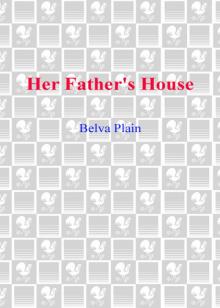 Her Father's House
Her Father's House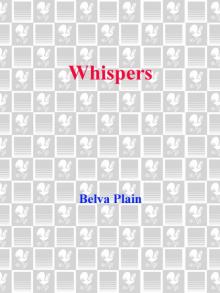 Whispers
Whispers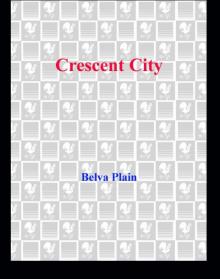 Crescent City
Crescent City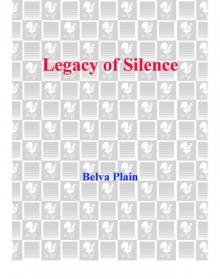 Legacy of Silence
Legacy of Silence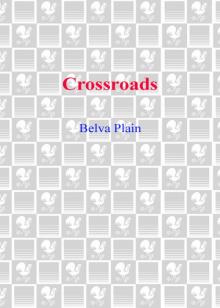 Crossroads
Crossroads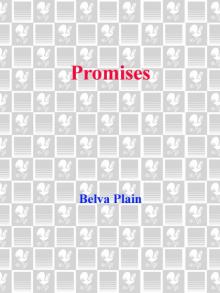 Promises
Promises After the Fire
After the Fire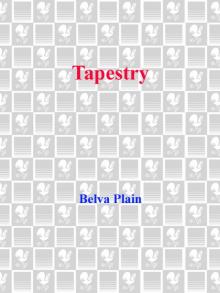 Tapestry
Tapestry Looking Back
Looking Back Heartwood
Heartwood The Carousel
The Carousel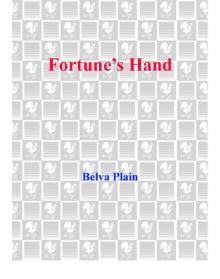 Fortune's Hand
Fortune's Hand Homecoming
Homecoming Random Winds
Random Winds Harvest
Harvest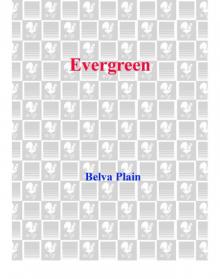 Evergreen
Evergreen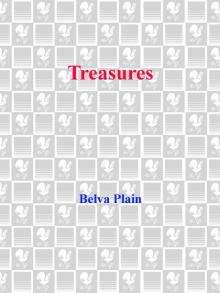 Treasures
Treasures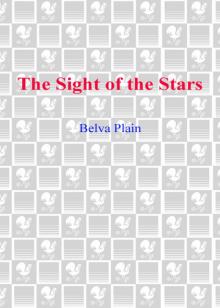 The Sight of the Stars
The Sight of the Stars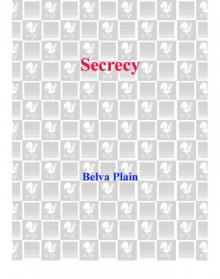 Secrecy
Secrecy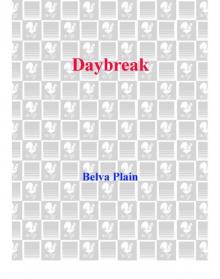 Daybreak
Daybreak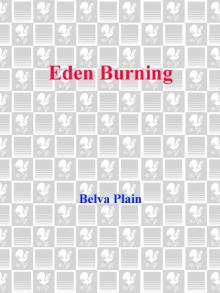 Eden Burning
Eden Burning